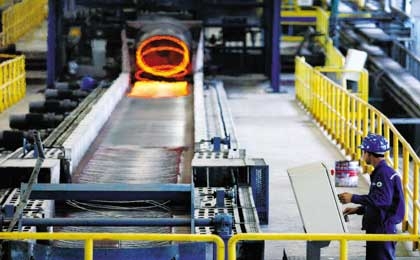Heat on pricing plan
 |
| Steel prices will need to be registered |
The Ministry of Finance (MoF) has just released Circular 122/2010/TT-BTC replacing Circular 104/2008/TT-BTC dated November 13, 2008 on price stabilisation.
Accordingly, from October 1, 2010, all enterprises, including private enterprises, are required to register their prices for 17 kinds of goods and services, including petrol, cement, construction steel, liquefied petroleum gas, milk, fertilisers and livestock feeds.
James Lockett, special counsel of Baker & McKenzie law firm in Vietnam, said the new rules were unnecessary because the main concerns were already regulated by Vietnam’s Competition Law, administered by the Ministry of Industry and Trade (MoIT).
“The new rules simply add duplication of that review by another ministry, adding more bureaucracy. This is contrary to the prime minister’s Project 30 administrative reform,” Locketttold VIR.
The new rules, he said, were heavily burdensome to business, requiring thousands of businesses to prepare and submit reports.
“This costs time and money. There will be hundreds of thousands of pages of reports and it is also impossible for the government to effectively read these reports,” Lockett said.
“With foreign trading partners, Vietnam has worked hard to convince them that it is a market economy for purposes of anti-dumping laws. Imposing government regulations of prices is a step away from a market economy. This will be noticed by World Trade Organization (WTO) trading partners and is likely to have an effect on Vietnamese companies involved in foreign dumping cases,” he added.
Under the circular, competent management agencies will be able to take price stabilisation measures if the prices of goods and services subjected to price control fluctuate unusually.
Specifically, management agencies will take action when the prices of goods and services go higher than price increases of input materials or than the prime costs of imports, or retailers offer prices improperly lower than production costs, or enterprises make use of their monopoly and dominance in the domestic market to create improper price ups and downs.
The MoF previously said the price registration did not violate international integration commitments, fully complied with WTO’s regulations and Vietnam’s reality and legal framework.
“The price registration is without distinction between domestic and foreign enterprises as stipulated in the previous price ordinance issued in 2002 and government decrees. Circular 104 regulated that enterprises required to register their prices were those in which state capital accounted for over 50 per cent of the charter capital.
The new circular will treat enterprises of different economic sectors equally and this is not contrary to market regulations,” said Nguyen Anh Tuan, deputy director of the MoF’s Price Management Department.
When the circular was still a draft, it raised strong protests from foreign investors concerned that price registration could affect Vietnam’s business environment. Eurocham and Amcham sent a letter to Prime Minister Dung with concerns about the draft.
The two organisations said price controls would create shortages by discouraging investment, which ultimately increased reliance on foreign suppliers. They argued foreign investors might be unwilling to invest if they perceived that the government would interfere with the market for these products by attempting to regulate the prices for these products.
“The European business community appreciates the government’s efforts to protect the price stability of certain goods essential to the population and to prevent inflation. However, the proposed circular, if implemented, will make many products subject to price stabilisation that are not essential for the population and against Vietnam’s aspirations to graduate to market economy status,” Dr. Matthias Duehn, executive director of EuroCham, told VIR last April.
Jocelyn Tran, chairwoman of Amcham, said: “Rather than price control, consideration should be given to liberalising the supply chain for distribution to make it more efficient as a more effective means of making products more affordable.”
What the stars mean:
★ Poor ★ ★ Promising ★★★ Good ★★★★ Very good ★★★★★ Exceptional
Related Contents
Latest News
More News
- Site clearance work launched for Dung Quat refinery upgrade (February 04, 2026 | 18:06)
- Masan High-Tech Materials reports profit: a view from Nui Phao mine (February 04, 2026 | 16:13)
- Hermes joins Long Thanh cargo terminal development (February 04, 2026 | 15:59)
- SCG enhances production and distribution in Vietnam (February 04, 2026 | 08:00)
- UNIVACCO strengthens Asia expansion with Vietnam facility (February 03, 2026 | 08:00)
- Cai Mep Ha Port project wins approval with $1.95bn investment (February 02, 2026 | 16:17)
- Repositioning Vietnam in Asia’s manufacturing race (February 02, 2026 | 16:00)
- Manufacturing growth remains solid in early 2026 (February 02, 2026 | 15:28)
- Navigating venture capital trends across the continent (February 02, 2026 | 14:00)
- Motivations to achieve high growth (February 02, 2026 | 11:00)

 Tag:
Tag:




















 Mobile Version
Mobile Version